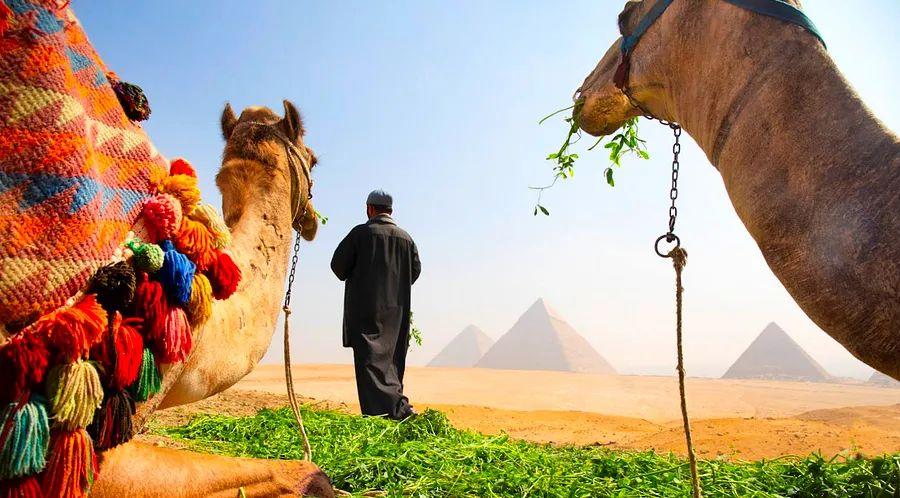14 essential insights before traveling to Egypt

Egypt's rich heritage resonates in its contemporary culture. There’s a wealth of experiences waiting for you, from awe-inspiring ancient landmarks to bustling streets filled with delightful aromas and a lively, diverse nightlife.
To make the most of your adventures, it’s important to consider the cultural customs of the country. Don't worry: this guide will assist you with planning, packing, and crucial tips on health, safety, and etiquette to ensure a memorable experience in Egypt.
1. It’s advisable to obtain your visa beforehand
With bags in one hand and necessary documents in the other, many travelers can smoothly board a flight to Egypt. If you're eligible, a renewable single-entry tourist visa can be obtained upon arrival for $25, valid for 30 days. However, ensure you have all required documents, as issues can result in denied entry.
If you prefer a multiple-entry visa or wish to skip the airport lines, you can apply for an e-Visa through the official government website before your trip to prevent any entry complications or delays.
 Make sure to plan your itinerary if you want to include a traditional felucca ride on the Nile. Photo by Repina Valeriya/Shutterstock
Make sure to plan your itinerary if you want to include a traditional felucca ride on the Nile. Photo by Repina Valeriya/Shutterstock2. Draft a preliminary itinerary
Egypt offers much more than just the pyramids, and effective planning will help you dodge any logistical hassles. Organize your days by location, especially in major cities where traffic can be both heavy and erratic, to facilitate smoother travel between sites.
If you’re a beach enthusiast, the North Coast and Naama Bay offer numerous spots for diving and snorkeling adventures. For those who love to explore off the beaten path, Egypt's hidden treasures—such as the breathtaking Siwa Oasis—are definitely worth the journey.
Egypt truly accommodates every type of traveler, and the key to crafting a tailored experience lies in prioritizing what matters most to you and planning accordingly.
3. Familiarize yourself with some basic Arabic phrases
Using Google Translate for quick inquiries about directions can be helpful, but genuine responses to simple greetings will be invaluable.
Most Egyptians are friendly and willing to assist when approached, but knowing a few phrases in Arabic can be beneficial when dealing with locals who don’t speak English. This knowledge can also help you navigate interactions with vendors or persistent salespeople. Learning a few words like “al salam alaykom” (hello), “shukran” (thank you), “aywa” (yes), “la’a” (no), and “ma’ al-salama” (goodbye) will be very helpful.
4. Don’t overlook the weather in Egypt – it can be both sweltering and chilly.
Sunscreen is essential if you want to avoid spending your vacation wrapped in ice packs. This is particularly important during the summer months, but it's a good idea year-round.
July experiences the highest temperatures, soaring between 34.7°C (94.5°F) and an intense 43.3°C (109.9°F). Despite the consistent sunshine, Egypt's desert climate brings particularly cold winters that can chill you to the bone.
The inadequately insulated buildings do little to keep the cold at bay, making it hard to convince yourself to step outside when it’s warmer out than in. Temperatures can drop to around 10°C (50°F) at times, so if you’re traveling between October and March, be sure to include some warm clothing along with your sunscreen.
5. Dress for the heat, but maintain a conservative style.
Egypt is famous for its cotton, making it the perfect place to wear breathable fabrics. Bring along light, airy clothes and don’t hesitate to flaunt pastels and vibrant colors. In major cities, the attire is typically casual, prioritizing comfort over style. However, keep in mind that Egypt has a largely conservative culture.
Loose-fitting clothing is a safe choice, as showing too much skin is generally not acceptable. Men can wear tank tops if they don't mind a few curious glances, but it’s best to avoid short shorts. Women should steer clear of low-cut tops, short skirts, and revealing dresses.
Beach areas tend to be more relaxed regarding dress codes, and locals are welcoming to tourists. So if you’re planning a trip to the beach, feel free to pack your shorts and sundresses.
 You can take taxis or hire private drivers for day trips. Matthew Storer/Shutterstock
You can take taxis or hire private drivers for day trips. Matthew Storer/Shutterstock6. Consider transportation when choosing where to stay
As you book your accommodations, pay attention to the available transportation options nearby. If your stay is brief, select a place that’s centrally located to the attractions on your list or near a metro station to minimize time spent in traffic. If you have more flexibility, you can choose a location that’s further out, but be aware that travel time may increase significantly.
In both Cairo and Giza, the metro system is the primary means of transportation, and female travelers are advised to use the women-only carriages for added comfort.
For some locations, additional planning is necessary, and using white taxis or Uber is recommended. If you choose a white taxi, ensure the meter is activated before getting in and consider hailing it a short distance from your hotel for a more economical fare. Be cautious of taxis that don’t use meters and may not cater well to tourists.
Depending on your budget, you can also explore options like long-distance buses and domestic flights.
7. Respect local customs at religious and historical sites
It’s crucial to not only dress suitably but also to be aware of local customs, particularly at specific attractions.
Visiting a mosque? Remember to remove your shoes before entering, and if you’re a woman, be sure to cover your head.
At a historical site? Avoid touching any artifacts and always use your camera without flash.
At the beach? You can absolutely wear your favorite swimsuit and unwind, but like everywhere else, there are social norms to follow. Stay observant and mimic the behavior of the locals if you’re uncertain.
Photography guidelines: Capturing images at tourist attractions is permitted, but avoid taking pictures of individuals without their permission, and refrain from shooting in areas where it's clearly banned.
8. Steer clear of public displays of affection
Egypt is generally conservative, and this applies to public displays of affection as well. While holding hands with your significant other is usually acceptable, keep your physical interactions mild and appropriate.
Friendly cheek kisses are a typical greeting among friends in Egypt but should generally be reserved for same-sex interactions depending on the context.
9. Carry small bills and be ready to tip
In Egypt, tipping remains a common custom, especially within the service sector. Tips, referred to as baksheesh, typically range from 5 EGP (less than $0.50) to 100 EGP ($5.50), depending on the recipient and context.
Egypt predominantly operates on a cash basis, so it's advisable to obtain both large and small denominations when exchanging currency for easier transactions and tipping.
At restaurants and cafes, a tip of 10% to 15% of the total bill is standard, while small change is expected for food bought from street vendors. Generous tips are generally given to those offering long-term services, such as drivers and tour guides. Although tipping is not mandatory for delivery services, taxis, and ride-hailing apps, many choose to tip well, given the low wages of gig-economy workers.
 Negotiating for a better price is perfectly acceptable in markets, but fixed-price stores do not typically allow haggling. Shutterstock
Negotiating for a better price is perfectly acceptable in markets, but fixed-price stores do not typically allow haggling. Shutterstock10. Bargaining for souvenirs is part of the adventure
Markets in Egypt offer a wealth of treasures, from papyrus scrolls and traditional keepsakes to beautifully crafted silver items and hand-painted pottery. If you think something is overpriced, don't hesitate to negotiate.
Vendors may not enjoy the back-and-forth haggling, but it's all part of the cultural experience, and by the end, you'll likely feel satisfied with your purchase, believing it to be a great deal.
Avoid negotiating in larger shops, especially near tourist sites, as prices are usually fixed when displayed.
Pro tip: Pay attention to the price range of similar items in nearby stores to ensure you're not being overcharged. Haggling is primarily reserved for souvenir shops, souqs (markets), and less formal selling areas.
11. Avoid drinking tap water and be cautious with food carts
To steer clear of any stomach issues that could spoil your Egyptian journey, skip tap water unless it’s filtered, particularly if you have a sensitive stomach. Bring along a reliable water-filtering system or follow the locals by using bottled water.
Egyptian cuisine is undoubtedly a highlight of the country, and it's tempting to try everything you see. However, some food carts may not store their offerings properly. As a visitor, it can be hard to judge, so consider choosing local restaurants instead, which often provide similar dishes but with better food safety standards.
12. Flood season occurs from June to September
Flooding can happen in Egypt between June and September, though it’s generally mild and confined to coastal areas. It’s wise to set up news alerts on your phone and stay updated with local news just in case.
Flooding is typically manageable, but some roads, particularly in certain parts of South Sinai, may be affected.
 Women traveling alone in Cairo might prefer to use the women-only metro carriages. Shutterstock
Women traveling alone in Cairo might prefer to use the women-only metro carriages. Shutterstock13. Solo female travelers might encounter unwanted attention
If you're a woman journeying alone, stay alert for potential harassers, scammers, and persistent hustlers. Assertive interactions can often deter them, but don’t hesitate to call for help or mention involving the police if needed.
As a general guideline, steer clear of engaging with individuals in dubious locations, such as isolated alleyways, dimly lit street corners, and deserted areas. Seek out crowds that include women and children if you ever feel uneasy. Only enter a taxi or Uber with the driver, use the women-only carriages on the metro in Cairo, and, like in many places worldwide, avoid walking alone after dark.
14. Tourist police are available to help in emergencies
Egypt is largely seen as a safe destination, but if you encounter a situation that requires police intervention, look for officers wearing a tourism police badge – a navy blue half sleeve featuring a gold eagle and the words 'Tourism and Antiquities Police' at the bottom. They are present at every major tourist site in Egypt and can be contacted by dialing 126 from any local mobile phone.
If you prefer to report an incident later, you can reach the Egyptian Ministry of Tourism and Antiquities by calling 19654. It’s also wise to have your home embassy or consulate's contact information readily available.
Pro tip: Consider getting an Egyptian SIM card when you arrive. They're affordable and will simplify your local communication. The top mobile providers in Egypt are Vodafone, Etisalat, Orange, and WE, with booths located in the arrivals hall of Cairo International Airport.

1

2

3

4

5
Evaluation :
5/5